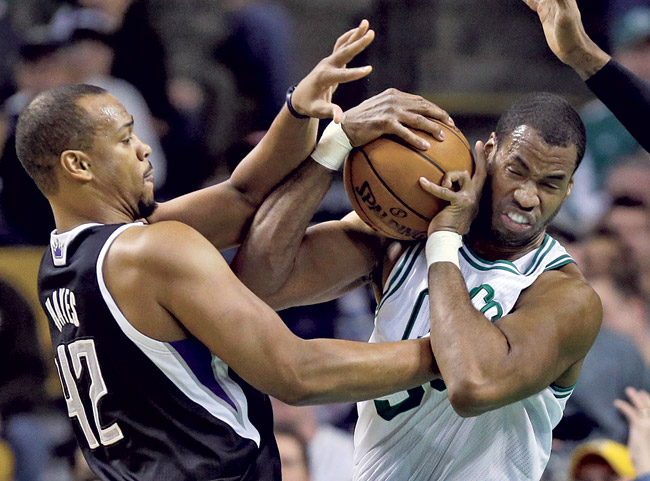Collins Not A Gay Man, Just A Man

Jason Collins (right) may find his off-court battles to be tougher than those he faced in the NBA | AP photo
Phillip Parker was 14 a year ago when he hung himself in the bathroom of his foster parents’ home. After years of physical and emotional abuse at the hands of his classmates, the high-schooler killed himself rather than face the continued torment that comes with being an openly gay male. His final cry for help was found in a nearby wastebasket, “Please help me, mom.”
This is why NBA veteran Jason Collins came out – not because he wanted attention or to flaunt the “gay lifestyle” in front of wholesome Americans and impressionable youths, but because he, like Parker, wants to live his life without prejudice or scorn.
We all do. It’s just much harder when you’re gay.
Eric James Borges, a film-maker, speaker and counselor, says in a online video for the “It Gets Better” project that his name wasn’t Eric, but faggot. He was spit on, assaulted, ostracized and thrown out of his family’s home. Months after the video was recorded, Borges, then 19, committed suicide, leaving a note thanking his friends, while noting, “My pain is not caused because I am gay. My pain was caused by how I was treated because I am gay.”
Collins likely never faced this type of hatred. He was afforded the protection of sport. At 7 feet tall and 255 pounds, Collins fit the mold of a macho, straight man. Selected in the first round of the 2001 draft, he built a long NBA career by putting his body – and sometimes the bodies of others – in positions of physical harm. It’s one of the reasons his announcement was so surprising. Collins is a big, tough man, and gay men – according to ignorant stereotypes – are effeminate and weak.
Collins’ announcement, while met with considerable support, also has been criticized with claims of indifference that, in fact, hide obvious prejudice. Countless online articles detailing Collins’ revelation were responded to by comments such as, “Why is this news? Why do we care what happens in a person’s bedroom?”
If the bigoted nature of the question is not readily apparent, look harder.
Collins’ story is not about the private actions within one’s home, but the public perception about what is appropriate and acceptable public behavior.
During an interview where the topic ventured into sexuality and the NFL, Atlanta Falcons’ cornerback Asante Samuel told Fox Sports Radio, “All respect, you know, I have nothing but respect for the … decisions they make and whatever.” Nothing offensive there. But he continues, “But you know, you don’t have to show it and flaunt it like that. You know what I’m saying. We have kids out here, too.”
The point here is not to single out the talented defensive back, but to use his comments as an active example of the issues facing gay men in particular.
Samuel criticizes homosexuals by maintaining flamboyant gay stereotypes. Homosexuality is not about living one’s life as the outrageous center float in a gay pride parade. Collins came out because he wants to live a normal, open life without the threat of ridicule or judgement.
By going public with his sexuality, Collins further helps disprove the myth of inferiority. Bigotry grows in the silence of fear and ignorance. Plus, his sexuality is hardly a threat to children, as Samuel seems to suggest.
Accepting the lifestyle of someone who has been forced to the edges of society is not always easy. Our own prejudices, whether we admit to them or not, invariably come into play and alter otherwise rational thought.
This is what makes Collins such an important figure. He is handsome, intelligent and a dignified spokesman for civil rights. That’s the issue, not sex.





